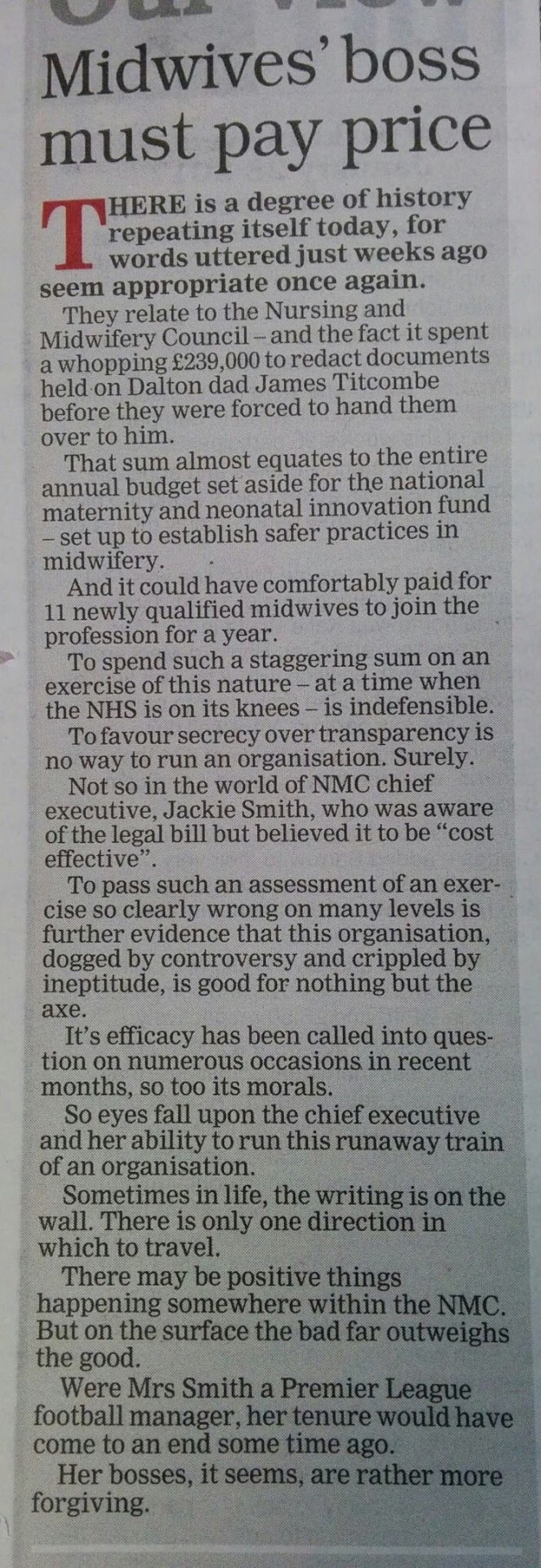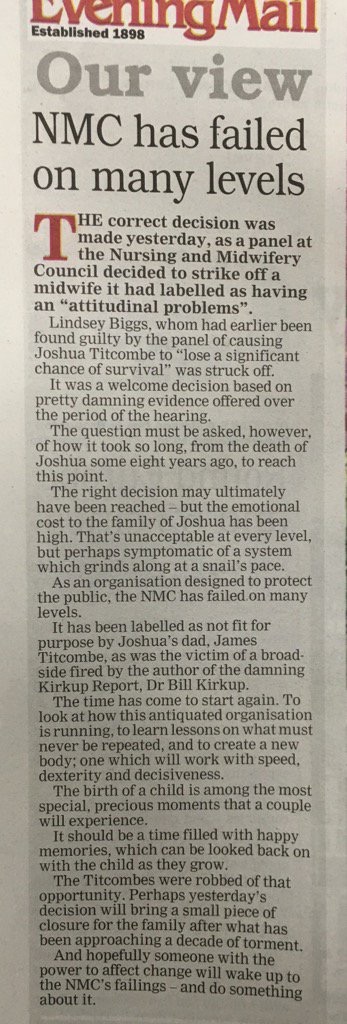I have been given permission to share this message by the experienced midwife who sent it to me. The midwife wanted to remain anonymous, which I think is a sign of an issue I’ve certainly experienced – that there is a real fear of raising and debating these issues as when people do, it often generates defensive / hostile responses from some.
Much of this rings true for me, having lost Joshua due a lack of awareness of the midwives looking after him in very basic signs of neonatal sepsis and also being contacted by many families who have experienced loss and harm and listening carefully to their stories.
Maybe it’s time to review midwifery training to incorporate these lessons?
“James I am really concerned that part of the problem with low risk perception in midwifery is that the majority of our workforce are no longer dual trained midwives. Those of us left who are also registered nurses will be mostly retired in the next ten years.
The transition of this workforce to direct entry midwives has coincided with a greater number of women with increased risk factors. This includes women having first pregnancies at a later age. The average age for mothers in 2014 was 30.2 years. There are higher levels of obesity and increased levels of pregnancy induced diabetes. Over a quarter (27.0% of live births in 2014 were born to mothers outside the UK). This greater ethnicity has brought an increase in indigenous physical, mental and social health issues. There are a greater number of women who have moved away from their support network or are unsupported from partners. There is an increase in female smoking, alcohol and substance misuse. There are a number of women having babies who may not have previously survived childhood illnesses or ever contemplated pregnancy (e.g. renal, cardiac disease and some neurological conditions). This explains part of the the reason there has been a reduction in maternal mortality from pregnancy related conditions in the last ten years but three quarters of women who died had a pre-existing medical or mental health condition before they became pregnant. This was mainly pre-existing heart disease, neurological conditions or mental health problems. With the possibility of complications in any mother or baby, midwives need extensive knowledge of co-morbidities and the skills of meticulous monitoring we had to develop as nurses. I for instance cannot listen to a fetal heart without feeling the maternal pulse and assessing its volume, rhythm and character whilst looking at the mother’s skin tone and respirations. Noting her skin temperature, breath smell, temperament, body odour and basically scanning her visually as a six sense before even carrying out any further observations. Hearing a blood pressure with your ears rather than reliance on an electronic sphygmomanometer provides so much more reliable information.
I would not think of caring for any woman without carrying out meticulous observations of both mother and baby at every point of contact because they are so vulnerable: every step of the way. It is not about medicalising a pregnancy, it is about the fact any woman potentially can develop complications at any stage in the pregnancy, during labour and postnatally. Early recognition, detection and prevention of an adverse outcome is key. I just wonder without an extensive nursing training, that many what I would term as red flags, go undetected.
Of course the same goes for caring for a newborn. That six sense of meticulous observation and assessment. I can never understand how some midwives do not even do observations and teach the mothers at the same time how to recognise abnormality in their babies. As a registered nurse we had to do placements in medical, surgical, paediatrics, maternity, psychiatry, A/E, community, orthopaedics, elderly and social care and ITU…..this does not happen anymore in nursing. There is no longer a paediatric, maternity and psychiatric placement..as these are covered by individual qualifications. Another gap in knowledge risk for the workforce.
For those of us left who are dual or triple trained, we had to be a state registered nurse with qualified experience as a registered nurse before doing midwifery. Hence we were a naturally older workforce starting training. We had the same if not more education input but it was within the midwifery unit. We were paid as registered nurses and were already a highly skilled workforce on starting our training which was a further 18 months on the 3 years training we already had. There were no long uni holidays just the same as everyone else. Tutors all on site working alongside you and those who were mentoring you would turn up often unannounced, day and night. Taking midwifery to university put a halt to the apprenticeship style of learning. We did not just have one of two mentors; there was a crowd effect of learning, nurturing and supervision.
I totally agree midwifery and nursing should be recognised as a degree level course but education should be moved 100% back to the midwifery units (this is where the education team should sit). Separating theoretical education from practical experience can cause break down of communication and disjointed learning. I have not posted this as a general comment as there are very strong opinions to the contrary. My fear is it will worsen now midwives have to pay tuition fees…..it’s a big financial commitment to study for an additional course and this will further deter nurses from entering the profession.
This could all be changed by valuing the workforce. Midwifery and nursing students should be paid for working: a band 4 salary. Registered nurses should be encouraged to take up midwifery with the incentive of maintaining a band 5 or 6 salary throughout their training (this should be an additional 18 months). This would solve part of the crisis of lack of recruitment, staff shortages and massive gaps in availability as seen in our current supernumerary student workforce. Bringing back 7.5 hour shifts will reduce the high incidence of sickness, burn out, mistakes because of tiredness and it will also reinstate that valuable shift change over period where so much learning took place. It also allows greater continuity for patients.”





